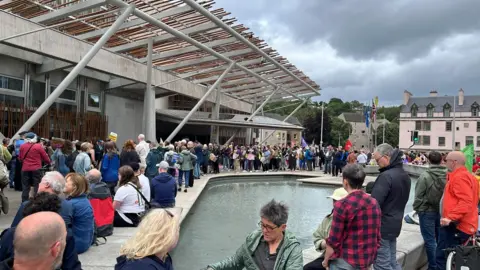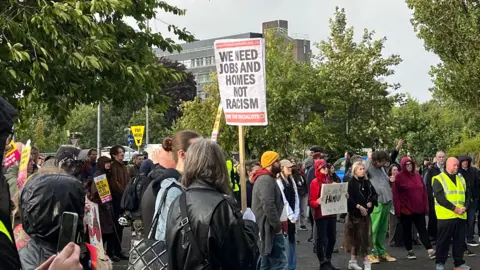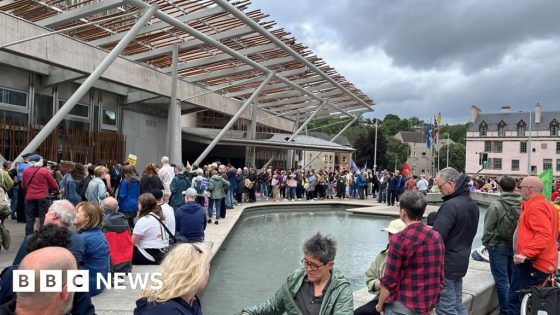 BBC
BBCAnti-racism protesters are gathering across Scotland, with demonstrations planned in Glasgow, Edinburgh, Dundee and Dumfries.
It comes in response to violence across England and Northern Ireland fuelled by far-right and anti-immigration sentiment.
The unrest began following the fatal stabbing of three young girls at a dance class in Merseyside in the north of England. Misinformation online claimed an asylum seeker was responsible for the girls’ murder.
Police said there was “no intelligence” to suggest there might be similar rioting in Scotland.
On Saturday morning, hundreds of demonstrators gathered outside the Scottish Parliament in Edinburgh.
They chanted “refugees are welcome here”.
Hundreds of demonstrators also gathered in Glasgow’s George Square.
At Planestanes in Dumfries, dozens turned up, some with placards showing messages of unity.
A demonstration is also planned for this afternoon at City Square in Dundee.

On Friday evening, about 150 people joined a Stand Up to Racism demonstration in Paisley and about 100 people gathered at a similar event in Bathgate, West Lothian.
The events were organised in response to rumours on social media that anti-immigration protests were being planned in the towns.
However, there was no sign of far right protests.
 PA Media
PA MediaFirst Minister John Swinney said on Friday that “adequate preparations” were in place to deal with any flare-ups should they happen and Police Scotland had the resources to deal with any potential disorder.
The force is expected to send 120 officers to Northern Ireland next week to support the police service there, which has been dealing with a number of incidents of disorder.
Mr Swinney has also written to social media companies Meta, TikTok and X calling for “immediate” action to tackle misinformation and hateful material which has fuelled violent scenes across parts of the UK.
The first minister said Police Scotland had specifically raised concerns with him about the time taken to remove problematic posts from social media.
He said some of the posts may have met the threshold for charges under Scotland’s hate crime laws that came into effect in April this year.
He urged social media companies to outline the action they were taking to resist the spread of misinformation and to address racist and hateful speech across the platforms.
“I think social media companies are completely passive about this kind of issue,” he said. “They have an obligation to operate within the legal framework of this country and they are regulated by the various regulatory approaches that are in place.
“They are allowing content to be circulated which incites hatred, which platforms violence and that’s unacceptable.”
Source Agencies


